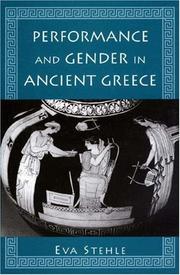| Listing 1 - 3 of 3 |
Sort by
|
Book
ISBN: 0231099959 Year: 1997 Publisher: New York Columbia University Press
Abstract | Keywords | Export | Availability | Bookmark
 Loading...
Loading...Choose an application
- Reference Manager
- EndNote
- RefWorks (Direct export to RefWorks)
Sociology of the family. Sociology of sexuality --- Sexology --- Poetry --- Homosexuality --- Female homosexuality --- Book --- Sappho of Lesbos --- Antiquity

ISBN: 8772887036 Year: 1997 Publisher: Aarhus : Aarhus universitetsforlag = Aarhus university press,
Abstract | Keywords | Export | Availability | Bookmark
 Loading...
Loading...Choose an application
- Reference Manager
- EndNote
- RefWorks (Direct export to RefWorks)
Hellanicus, --- Thucydides. --- Cimon, --- Greece --- Grèce --- History --- Historiography. --- Histoire --- Historiographie --- Hellanicus of Lesbos --- Thucydides --- Fukidid --- Tucídides --- Thukydides --- Thoukydidēs --- Tucidide --- תוקידידיס --- Θουκυδίδης --- -Hellanicus of Lesbos --- Thucydide --- Thoukudides --- -Hellanicus, --- Grèce --- Ellanico, --- Hellanicos, --- Hellanikos, --- Lesbos, Hellanicus of --- Cimone, --- Kimōn, --- Griechenland --- Hellas --- Yaṿan --- Vasileion tēs Hellados --- Hellēnikē Dēmokratia --- République hellénique --- Royaume de Grèce --- Kingdom of Greece --- Hellenic Republic --- Ancient Greece --- Ελλάδα --- Ellada --- Ελλάς --- Ellas --- Ελληνική Δημοκρατία --- Ellēnikē Dēmokratia --- Elliniki Dimokratia --- Grecia --- Grčija --- Hellada --- اليونان --- يونان --- al-Yūnān --- Yūnān --- 希腊 --- Xila --- Греция --- Gret︠s︡ii︠a︡

ISBN: 0691036179 1306984262 0691602433 0691631913 1400864291 9780691036175 9781400864294 9780691602431 Year: 1997 Publisher: Princeton, New Jersey
Abstract | Keywords | Export | Availability | Bookmark
 Loading...
Loading...Choose an application
- Reference Manager
- EndNote
- RefWorks (Direct export to RefWorks)
"Like love, Greek poetry was not for hereafter," writes Eva Stehle, "but shared in the present mirth and laughter of festival, ceremony, and party." Describing how men and women, young and adult, sang or recited in public settings, Stehle treats poetry as an occasion for the performer's self-presentation. She discusses a wide range of pre-Hellenistic poetry, including Sappho's, compares how men and women speak about themselves, and constructs an innovative approach to performance that illuminates gender ideology. After considering the audience and the function of different modes of performance--community, bardic, and closed groups--Stehle explores this poetry as gendered speech, which interacts with performers' bodily presence to create social identities for the speakers. Texts for female choral performers reveal how women in public spoke in order to disavow the power of their speech and their sexual power. Male performers, however, could manipulate gender as an ideological system: they sometimes claimed female identity in addition to male, associated themselves with triumph over a defeated (mythical) female figure, or asserted their disconnection from women, thereby creating idealized social identities for themselves. A final chapter concentrates on the written poetry of Sappho, which borrows the communicative strategy of writing in order to create a fictional speaker distinct from the singer, a "Sappho" whom others could re-create in imagination.Originally published in 1997.The Princeton Legacy Library uses the latest print-on-demand technology to again make available previously out-of-print books from the distinguished backlist of Princeton University Press. These editions preserve the original texts of these important books while presenting them in durable paperback and hardcover editions. The goal of the Princeton Legacy Library is to vastly increase access to the rich scholarly heritage found in the thousands of books published by Princeton University Press since its founding in 1905.
Women in the performing arts --- Sappho --- Scops --- Poetry reading --- Reading poetry aloud --- Sapfo --- Sapfo van Lesbos --- Sappho van Lesbos --- Femmes dans les arts du spectacle --- Sex role --- Oral tradition --- Women and literature --- Bards and bardism --- Oral interpretation of poetry --- Greek poetry --- Gender role --- Sex (Psychology) --- Sex differences (Psychology) --- Social role --- Gender expression --- Sexism --- Druids and druidism --- Poetry --- Poets --- Minstrels --- Scalds and scaldic poetry --- History --- History and criticism. --- Oral interpretation --- Sapho --- Friends and associates. --- Greece --- Social life and customs. --- Poésie grecque --- Poésie --- Rôle selon le sexe --- Histoire et critique --- Lecture publique --- Histoire --- Grèce --- Moeurs et coutumes --- Gender roles --- Gendered role --- Gendered roles --- Role, Gender --- Role, Gendered --- Role, Sex --- Roles, Gender --- Roles, Gendered --- Roles, Sex --- Sex roles
| Listing 1 - 3 of 3 |
Sort by
|

 Search
Search Feedback
Feedback About UniCat
About UniCat  Help
Help News
News